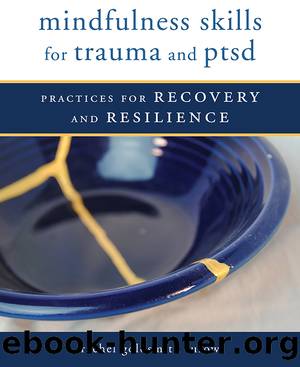Mindfulness Skills for Trauma and PTSD by Rachel Goldsmith Turow

Author:Rachel Goldsmith Turow
Language: eng
Format: epub
Publisher: W. W. Norton & Company
Practice #2: Observe Layers of Meaning
Our layers of meaning often operate in subtle and sneaky ways, outside of our conscious awareness. As we notice these layers, their power diminishes. Mindfulness practice builds our capacity to observe thoughts in general as changeable, and increases our ability to watch even subtle thoughts go by without necessarily believing them or getting wrapped up in them (overidentifying). We can begin to choose how to interpret the trauma and its meaning, rather than letting our unintentional interpretations take charge.
This process begins with the intention to just notice. In order to get into the ânoticingâ mindset, it can be helpful to start with something less emotionally charged than our interpretations of trauma, such as noticing our breathing or other bodily sensations.
You can then direct this same observational perspectiveâjust noticingâtowards noticing layers of meaning, or âtrauma-related appraisalsâ about yourself, others, and the world. It may be hard to just notice, without getting whisked away on a speeding train of thought. Layers of trauma are mentally âsticky,â because they are entangled with so many other memories, thoughts and emotions. Our aim is to notice all of these layers, but to maintain our âwitnessâ perspective, where we notice what is there and then let it pass. Some layers of meaning may emerge suddenly, whereas others may take some time to discern.
When we work to observe layers of trauma, it may help to base our curiosity around specific questions, such as the following:
What beliefs have I developed about myself in response to the trauma?
Do I have any shame/guilt/self-blame/anger about what happened?
Do I have any judgments about my emotional response to traumaâfor instance, the idea that I should not feel the way that I feel?
How has my view of myself changed after the trauma?
What are my ideas and assumptions about the worldâthat is, my sense of whether the world is safe or dangerous, or what kinds of things are likely to happen to me in the future?
When I meet new people, do I project assumptions on them that stem from the trauma?
How do I feel connected to other people, communities, nature, or the world? How do I feel disconnected?
When we observe our responses to these questions, it can be natural to judge them. The answers to these questions might feel unwanted or upsetting, and contradict our ideas of how we âshouldâ feel or think.
Another common experience when noticing layers of thoughts and feelings is that we become overwhelmed with the quantity and interconnections of all of the layers. To the extent that we can, we might benefit from trying to notice them one at a time, and by trying to observe all we can about one before moving on to the next. It is also fine to return to noticing breathing or bodily sensations at any time when becoming upset or overwhelmed. It might also be helpful to offer self-compassion for any painful layers that emerge (see Practice #5 below). Before ending the exercise, we can return our attention to the breath or other neutral object of focus in order to reengage a nonjudging, observational stance.
Download
This site does not store any files on its server. We only index and link to content provided by other sites. Please contact the content providers to delete copyright contents if any and email us, we'll remove relevant links or contents immediately.
Should I Stay or Should I Go? by Ramani Durvasula(7652)
Why We Sleep: Unlocking the Power of Sleep and Dreams by Matthew Walker(6697)
Fear by Osho(4727)
Flow by Mihaly Csikszentmihalyi(4685)
Rising Strong by Brene Brown(4448)
Why We Sleep by Matthew Walker(4433)
The Hacking of the American Mind by Robert H. Lustig(4375)
How to Change Your Mind by Michael Pollan(4355)
Too Much and Not the Mood by Durga Chew-Bose(4337)
Lost Connections by Johann Hari(4171)
He's Just Not That Into You by Greg Behrendt & Liz Tuccillo(3889)
Evolve Your Brain by Joe Dispenza(3668)
The Courage to Be Disliked by Ichiro Kishimi & Fumitake Koga(3486)
Crazy Is My Superpower by A.J. Mendez Brooks(3397)
In Cold Blood by Truman Capote(3374)
Resisting Happiness by Matthew Kelly(3337)
What If This Were Enough? by Heather Havrilesky(3308)
The Book of Human Emotions by Tiffany Watt Smith(3300)
Descartes' Error by Antonio Damasio(3270)
